




 |
   |
 |
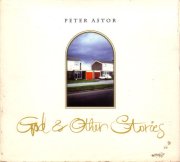 |
God & Other Stories (1993, 44.18) ***/T½ |
|
| Big Dumb Song The Monkey God Disco Lights Miss A Still Wednesday The Lost Weekend Starts Here |
St Paul's Mambo On Saturday Night Another Sunday Underground No Food is Blue Ha Ha Ha Big Dumb Song Again |
|
Current availability:
Mellotron used:
Peter Astor is a veteran of fêted '80s British indie outfits The Loft and The Weather Prophets, going solo upon the dissolution of the latter at the end of the decade, 1993's God & Other Stories being his fourth album in four years, before he took a lengthy break from music. It's a very respectable singer-songwriter effort, full of well-constructed songs like Another Sunday or Ha Ha Ha and few (if any) '80s production hangovers, which is a bonus.
The album was recorded at Brian O'Shaughnessy's studio in Walthamstow, East London, who's used Radio Massacre International's Mellotron on occasion. Owner Duncan Goddard actually plays it this time round, with faint strings on On Saturday Night and much more upfront ones on Another Sunday and closer Big Dumb Song Again, to generally good effect. Overall, this is the kind of album which should appeal to fans of, say, Lloyd Cole or even Elvis Costello, so, with two decent Mellotron tracks, is just about worth picking up for the Mellotron fan, too. Most acceptable.
 |
The Black Chord (2012, 47.07) ****½/TTTTCocoonThe Black Chord Quake Meat Drift Bull Torpis Barefoot in the Head |
Current availability:
Mellotron used:
Regular readers of this site surely need no introduction to Astra; psychedelic hard rock/proggers from San Diego, their Mellotronically sampletastic debut The Weirding got many of us exceedingly hot under the collar, even if it, shall we say, lacked originality in places. Three years on, The Black Chord is, if anything, even better, avoiding its predecessor's inclinations towards faint plagiarism, sounding exactly like Astra, but more original. All six tracks are superb, but mention must be made of the title track, which is, frankly, fucking massive, while elemental closer Barefoot In The Head, named in honour of Brian Aldiss' most experimental (not to mention druggy) novel. There may be no one riff here quite as memorable as that one from The Weirding itself, but the overall impression is of a band who've found their feet and know exactly where they're going.
Richard Vaughan and Conor Riley both play real Mellotron this time round, heavily encouraged by producer Ian Lehrfeld to use Brian 'Moog Cookbook' Kehew's lairy purple M400, although I hear that the band's Memotron still made it onto a few tracks. It's almost irrelevant to detail their use; suffice to say, they use brass, strings and choirs across all six tracks, notable Mellotronic moments including the filthy solo brass melody that opens the title track and the huge, discordant string chord in Barefoot In The Head.
Do you need any more encouragement to go out and buy this? You know, BUY, as against 'find a free download'? A superb album, already up there as a contender for album of the year at Planet Mellotron. Buy. Now. Incidentally (and amusingly), the CD booklet, which devotes a page to each of the five band members, includes several pics from their first UK gig, from 2010, my hired-in M400 clearly evident in one shot.
See: Samples etc. | Silver Sunshine | Birth
 |
Stand on it (1996, 40.28) ***/½ |
|
| Face to Face Much Too Proud Slide Into a Dream Crazy Foot Mucus Nail Me Down Stand on it Sybil Movements and Pain |
Romantic Bowler Don't Let Them See Your Face Not That it Means So Much |
|
Current availability:
Mellotron used:
Going by their third full album, 1996's Stand on it, Astroburger sit at the acceptable end of indie, incorporating tropes from powerpop and punk; not actually very indie at all, but I can't think what else to call their stylistic mish-mash. Highlights include the pop/punk of Nail Me Down, the title track and Don't Let Them See Your Face, but nothing here should appal the discerning listener.
Rodolpho (a.k.a. Rolf Yngve Uggen of Gluecifer) plays a quavery Mellotron flute line on Sybil, albeit not for very long. Real? I think so, but know you what slippery devils these samples can be, even early ones... The band released an album as recently as 2013, but I don't know if they ever used a Mellotron again.
 |
Out in the Streets (1986, 11.18) ***½/TTFarewellFinale Kōfuku no Owari Ni Out in the Streets |
 |
Crystal Days (1987, 33.53) ***/T½ |
|
| Bonnou Chasing Shadows Ain't No Crime Ikarosu no Tsubasa Jigyaku Mono Crystal Days Communicate War Dead Line |
Illusion of the Empty Room Tight Rope Remember Tomorrow (N.G) In Your Dreams Enbukyoku |
|
Current availability:
Mellotrons used:
Asylum's 1986 EP, Out in the Streets, sounds like an '80s Japanese take on the proggier end of the metal scene, almost accidentally inventing prog-metal a few years early, although track three is punkier. Best track? Probably Out In The Streets itself. Ybo²'s Masashi Kitamura plays Mellotron, with a brief string part on opener Farewell, skronky flutes and strings on Finale and cellos (and strings?) on the title track.
1987's Crystal Days gives us an odd cross between punk and metal, with the occasional burst of something proggier. The album's eclecticism is also its downfall, as the impression given is of two different albums co-existing on the same piece of vinyl, often within the same song. Better tracks include Ikarosu No Tsubasa, Illusion Of The Empty Room and closer Enbukyoku, but it's all a little hit-and-miss, to be honest. Kitamura, this time billed as 'Joseph "K"', plays Mellotron on two tracks, with distant strings and flutes on the title track and upfront strings on Enbukyoku, although only the latter's really worth hearing for its Mellotron use. I haven't heard the expanded CD version of the album, but I doubt whether there are any more Kitamura contributions.
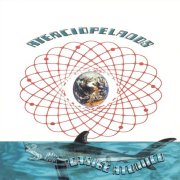 |
Caribe Atómico (1998, 44.33) ***/T |
|
| Caribe Atómico El Estuche Maligno El Desinflar de Tu Cariño Mienteme Cosmos Péndulo Humo y Alquitrán |
Mañana Doctora Corazón Reacio Días |
|
Current availability:
Mellotron used:
Aterciopelados (Velvety Ones) are apparently Colombia's top Latin rock act and, going by their fourth album, 1998's Caribe Atómico (literally, 'Atomic Caribbean'), they successfully fuse message politics, Colombian folk musics, more general Latin influences and Western pop/rock to create a heady whole that packs 'em in back home. As their countrywoman Shakira has proven, South American music can travel, although it seems to fight an uphill battle away from Latin areas. I'll leave track-by-track breakdowns of the album to those who understand this music better; suffice to say, it's very little like Santana, although the rhythmic base is similar and is more likely to appeal to Spanish speakers and those who prefer dancing to chin-stroking.
Andres Levin produced the NYC-recorded album, adding various obscure keyboards as he saw fit, including an Ondioline and a Mellotron, although you'll have to strain pretty hard to hear the latter until the closing minutes of the album, where there's a full-on and definitely genuine flute part on Días, with what sound likes a single string note thrown in, as if Levin was messing about with the track selector. Anyway, yer rock/prog/Western music generally fan is probably not going to get much out of this, but it seems to be good at what it does. Oh and if you want European credibility, Roxy Music guitarist and all-round Colombian Phil Manzanera produced their previous record, La Pipa de la Paz.
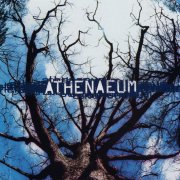 |
Athenaeum (2001, 40.37) **½/T |
|
| Suddenly Damage Comfort Frozen in Time Sweeter Love Plurabelle All My Life Waiting for You |
Mistake If Baby's Gone |
|
Current availability:
Chamberlin used:
Athenaeum's eponymous third (and second major-label) album sits at the indie end of powerpop, sadly, much of its content lacking the killer melodic punch that sets the leaders out from the followers. Better tracks include opener Suddenly, Sweeter Love and Waiting For You, but drivel like All My Life and Frozen In Time drag the album down.
Bassist Alex McKinney plays Fidelitorium Studios' Chamberlin on two tracks, with occasional pseudo-orchestral strings on Sweeter Love and chordal ones on closer If Baby's Gone, neither to any great effect. Athenaeum made another two albums before splitting, seemingly for good.
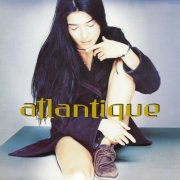 |
Atlantique (1994, 65.52) **½/TT |
|
| Pourquoi Faire Mes Lacets Dafaits Sois Pas Gris Nelson Billie, Joe et Moi Interlude 1 Les Cheveux Emmêlés Souris Moi |
Gris Matin Les Eaux de Mars Je Veux Rester au Lit Interlude 2 Rêve-Révolution À Contre Temps Contre Vents et Marées Je Veux Rester au Lit (Al Stone remix) |
|
Current availability:
Mellotron used:
Atlantique Khanh had a brief singing career in the mid-'90s, the heavily overlong Atlantique being her second and last album, a set of soulful, jazzy, French-language material, probably at its best on the funky Interlude 1, the (relatively) raw Souris Moi and Contre Vents Et Marées, which, amusingly, starts with a sample of Ozzy Osbourne's iconic harmonica opening from Sabbath's The Wizard.
Four credited Mellotron tracks from three players: Mervin Afrika (or Africa) plays an octave flute part on opener Pourquoi Faire, Brendan Lynch adds flutes and strings to Sois Pas Gris, while Mick Talbot plays chordal strings and flute melodies on Gris Matin and Les Eaux De Mars. Someone plays uncredited flutes on Souris Moi and Interlude 2, too, the former possibly by Afrika and the latter by Lynch, none of which makes this worth the effort on either musical or Mellotronic grounds.
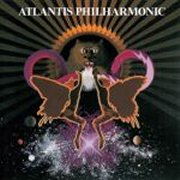 |
Atlantis Philharmonic (1974, 36.04) ****/TTTAtlantisWoodsman Death Man Fly-the-Night My Friend Atlas |
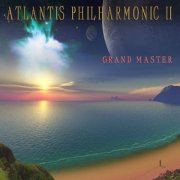 |
II: Grand Master (2008, recorded 1975, 38.59) ***½/T |
|
| Hello Unity Song of Three The River Grand Master Amduscias the Great Burning Bridges King Music Man |
Sunshine Photographs and Memories |
|
Current availability:
Mellotrons used:
Atlantis Philharmonic were an American progressive duo comprising percussionist Royce Gibson and Joe DiFazio on everything else; amazingly, I'm told they managed to do it live, DiFazio playing keyboards, bass pedals and guitar simultaneously (thanks, David). Their sole contemporary release, Atlantis Philharmonic, is a mixture of magnificently pompous, overblown pieces like Atlantis and Atlas and gentler songs along the lines of Woodsman, although even the quieter sections carry an undertone of menace. DiFazio was obviously a good all-rounder, as his keyboard playing sounds classically-trained, while his guitar and vocal work are perfectly respectable, too.
Three Mellotron tracks; Atlantis and My Friend have some reasonable string parts, but the real highlight is the lengthy, orchestrated strings part in Woodsman; this one track is almost the decider on its own; an absolute killer. You may find the album a bit on the heavy side, but if you don't mind a bit of 'oomph' in your prog, go for it. Incidentally, despite rumours, there's no Mellotron on the (rather ropey) live tracks added to KaediSongs' reissue, merely some echoed 'aaahs' on Atlas from the band members.
The band recorded a second album, destined only to be released some thirty-odd years later, in 2008, as II: Grand Master. Its first few tracks aren't too inspiring - think: budget Styx, or the pomp direction Fireballet were headed in at the time - but we still get a few prog epics, notably Grand Master itself, Burning Bridges and closer Photographs And Memories, while nothing here actively offends. Still, a definite step down from their debut. DiFazio on Mellotron again, with cello and string parts on Amduscias The Great, although the strings on Burning Bridges sound more like string synth.
 |
Blå Vardag (1979, 38.34/57.12) ****/TTTElisabitenPå Gata Blå Vardag Gånglåt Den Vita Tranans Väg [CD adds: Björnstorp [from the Mosaik LP] Hemifrån Sebastian] |
Current availability:
Mellotron used:
Atlas were one of the many lower-division progressive bands from the '70s, particularly the tail-end of the decade. Blå Vardag (Blue Tuesday) was recorded in '78 and released in '79, just as the scene was coming to a close, at least for a while. Fully instrumental, Atlas had a jazzy feel in places, mixed with more traditional symphonic progressive rock. Much Fender Rhodes and MiniMoog from the two keyboard players, Erik Björn Nielsen and Björn Ekborn, with a little Mellotron thrown in for good measure on three of the album's five tracks, the most Mellotron-heavy track being the album closer, Den Vita Tranans Väg.
While by no means a Mellotron Classic, this is an excellent album, well worth any prog fan's time. The CD reissue includes three bonus tracks, one of which is the only Mellotron track from the post-Atlas Mosaik album from 1982. There's also some very nice Mellotron on CD closer Sebastian, rescued from a radio recording.
See: Mosaik
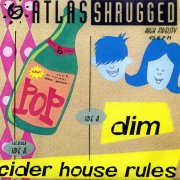 |
download (2018, recorded 1993) ***/T Ciderhouse Rules |
Current availability:
Chamberlin used:
Atlas Shrugged (named for, though hopefully not in honour of the loathsome Ayn Rand's novel), nothing to do with any other band of the same name, were an early '90s powerpop outfit featuring the talents of Corin Ashley, who's uploaded an unreleased track, Ciderhouse Rules, to his Bandcamp page. It's a decent enough track, if hardly groundbreaking; given that you can hear it for nothing (it's also on YouTube), powerpop fans might as well give it a listen.
Mike Denneen plays (presumably) Q Division Studio's Chamberlin MusicMaster 600, with mandolins and flutes (and other stuff?) across the track. Again, nothing startling, but nice to hear.
See: Corin Ashley
 |
Lady of Shalott (2002, recorded 1977, 121.31) ****/T½ |
|
| Lady of Shalott Cuckoo (Love's Labour's Lost) Tomorrow Love is Waiting for a Lover Cuckoo - alternate version [Announcement] Tomorrow (live) Lady of Shalott (live) |
Catharsis (by Isotopy) Nightmare (by Me El-Ma) Toridtagitar (by Me El-Ma) The Children Dance (by Me El-Ma) |
|
Current availability:
Mellotron used:
Is this deluge of utterly obscure progressive bands ever going to stop? Hopefully not, going by the standards set by this double-disc set. Atmosphera were Israel's first symphonic prog outfit, including future members of Zingale, who are just about the only other one anyone's ever heard of and would'ja believe... they're excellent? There's a heavy Yes influence in what they were doing, with both Efraim Barak's vocals and Moti Fonseca's guitar style mirroring those of their Yes counterparts, which is in no way to decry the band's achievements; the material is well-written and recorded and it's a real shame it wasn't released at the time. The CD booklet gives the band's full history, explaining how yet another promising outfit fell by the wayside; at least tapes a) were made and b) survived...
The title track and Cuckoo are both sixteen-minute epics, moving through all the requisite changes that the style demands and although Tomorrow and Love Is Waiting For A Lover are cleaned up rehearsal tapes, I've heard an awful lot worse, although I'm not convinced the songwriting's quite up to the standard of the first two tracks. Now, the oddity here and the reason the album's on this site at all is the alternate version of Cuckoo. As far as I can work out, it utilises elements of the other version, but with the intro and outro piano sections taken from a demo and much overdubbing of keyboards, including the Mark II and M400 Mellotrons also used by Rockfour from original keyboardist Yuval Rivlin. Much upfront Mellotron, with strings and flutes probably from the Mark II and M400 choirs, all complementing the piece very nicely, as do the ARP 2600, Hammond and Rhodes, amongst other vintage gear.
The second disc comprises various live and radio session tracks, a VCD video-only track and some post-Atmosphera things, including three from drummer Me El-Ma. To be quite honest, your life wouldn't be incomplete if you never heard most of this stuff, but I can perfectly well understand the urge to make everything available, although I suspect many of you will find the El-Ma stuff quite hard going. 'Weird shit' is, I believe, the appropriate expression. I haven't yet managed to play the video material, though I expect it's worth seeing, but I'm not entirely sure the listening public wouldn't be better served by a one-CD version, too, though that would almost certainly be too expensive a proposition to make it worthwhile. Anyway, disc one is excellent, with one Mellotron epic, albeit with recent overdubs.
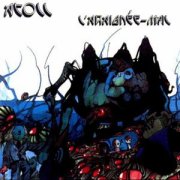 |
L'Araignée-Mal (1975, 44.03) ****/½Le Photographe ExorcisteCazotte No. 1 Le Voleur d'Extase L'Araignée-Mal Imaginez le Temps L'Araignée-Mal Les Robots Debiles Le Cimetiere de Plastique |
Current availability:
Mellotron used:
I've owned copies of Atoll's first and third releases, Musiciens/Magiciens (***½) and Tertio (***½) for a while, finding them both 'good but not great', so I was completely blown away by L'Araignée-Mal, with its prog/fusion crossover feel, complete with great material. The only piece that sounds more jazz than prog is Cazotte No. 1, reprised with a live version on Musea's CD reissue, the rest of the material inserting some jazziness into the excellent symphonic prog, replete with violin.
Keyboard man Michel Taillet only seems to play clavinet and a gorgeous-sounding Eminent string synth (essentially a Solina/ARP String Ensemble), with Bruno Gehin guesting on most of the keys, particularly Rhodes and some superb MiniMoog work. Gehin's also credited with Mellotron, but apart from a single string note on Le Photographe Exorciste that may or may not be, the only thing I can hear is (I think) a few flute chords on the first part of the excellent side-long title track, so I really wouldn't go here for Mellotron. However... if you like your prog symphonic and a little jazzy, buy this immediately, while it's still in print. Superb.
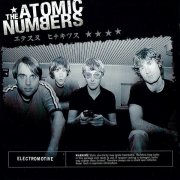 |
Electromotive (2000, 43.32) ***/½ |
|
| I am in Remote Control Sellout In Your Power Fashion Money Lovesong In No Hurry Superexcitable Life of the Party Secret Identity |
Flawless I Don't Wanna Go Out, I Don't Wanna Stay Home Creature Comforts Who Killed Rock and Roll |
|
Current availability:
Mellotron used:
The Atomic Numbers were a kind of new wave/powerpop hybrid, 2000's Electromotive (their sole album?) at its best when furthest from the occasional hint of indie-ness that crops up here and there. Highlights? Maybe In Your Power, the propulsive Superexcitable and the punky Secret Identity, but, overall, this is much better than expected.
Guitarist Zach Shipps plays a brief, genuine-sounding Mellotron string part on Creature Comforts, but you're unlikely to go out of your way to hear it for that reason, frankly. Not bad, then, punky end of alt.rock.
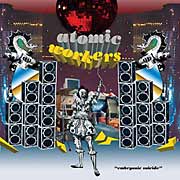 |
Embryonic Suicide (2006, 47.22) ***/TEmbryonic SuicideNo Reaction White Plastic Man Hurdy Gurdy Man Down on Earth Far Away Breakfast on the Ocean (part I) |
Current availability:
Mellotron used:
Atomic Workers were a collaboration between members of Italian psychsters That's All Folks! and Gary Ramon and Laurence O'Toole from Sundial, so it won't come as much of a surprise to hear that the end result of their labours, 2006's Embryonic Suicide (recorded 2003-4) is a mind-melting slab of heavy psych, almost punk in places. It's at its best on their woozy take on Donovan's Hurdy Gurdy Man, LP closer Far Away and nine-minute CD bonus track Breakfast On The Ocean (Part I), but nothing here should obviously have been left off.
Ramon plays (presumably his own) Mellotron, with background strings on Plastic Man, but it's hardly something you'll go that far out of your way to hear. The album itself will keep heavy psych fans happy, but don't bother for the Mellotron.
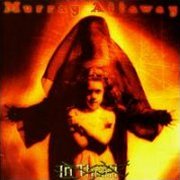 |
In Thrall (1993, 48.13) ***½/TT½ |
|
| No Tears Tonight Under Jets Allegory Angels in the Trees Living in Another Time The Evensong Fall So Far August Rain |
Walpurgis Night My Book Home |
|
Current availability:
Mellotron/Chamberlin used:
Murray Attaway was frontman with well-respected gentlemen Guadalcanal Diary, possibly the best 'Athens, Georgia scene' band, certainly superior to what R.E.M. became. After their (first) split, Attaway signed with Geffen and recorded the really rather good In Thrall, carrying on his former band's adventures with jangly guitars and meaningful songs. I really hate to keep quoting favoured artists as influences, in true Record Collector style, but parts of this album don't half sound like Richard Thompson at his most upbeat, especially in the guitar department, which is no bad thing. I suspect it'll take a few more plays for its charms to make themselves fully apparent (quite when I'll find the time to do this, I've no idea), but there doesn't seem to be a bad track on the album, which is pretty good going by anyone's standards.
The album is absolutely stuffed with Chamberlin, with the odd bit of Mellotron creeping in, all in the days before both instruments were routinely sampled. Saying that, with contributors of the stature of Jon Brion and Patrick Warren, samples aren't really in the offing, I'm glad to say. Attaway himself and Tony Berg also play various tape-replay instruments, while Brion gets some of his beloved Optigan in, too. Anyway, a weird Chamby flute pattern on No Tears Tonight, what I presume to be Mellotron cellos and Chamby brass on Under Jets, Mellotron flutes on Allegory, along with Chamberlin something. Chamby 'Strawberry Fields'-style somethings (not flutes) on Living In Another Time and Chamby solo male voices on My Book makes for a pretty good Mellotron/Chamby effort, although most of the parts are typically brief; whad'ya think this is? Prog?
 |
Audra & Alayna (1998, 39.05) **½/T |
|
| Tell Me Save Me Baby Back to You Ponder This I Can See You The Very Thing Don't Change a Thing Falling Away |
You Lose Ebenezer |
|
Current availability:
Mellotron used:
Texan twins Audra and Alayna Maxwell relocated to Nashville in the late '90s, releasing just the one album, '98's Audra & Alayna, a breezy pop/rock confection that could've been huge, but wasn't. Luck of the draw, I suppose. Unsurprisingly, their voices blend well, at their best on the vaguely bluesy Save Me Baby and the balladic Ponder This, but, over ten tracks, the effect is mildly numbing, like being wrapped in candyfloss (cotton candy, Americans).
Phil Madeira plays Mellotron, with a flute line on Back To You and chordal flutes on You Lose, neither to any great effect, if truth be told. This nearly garnered three stars, but, as I said above, the cumulative effect of the girls' sticky-sweet voices becomes a little too much after a handful of tracks.
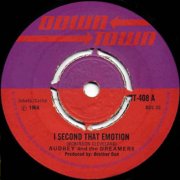 |
7" (1968) ***/T I Second That Emotion Dear Love |
Current availability:
Mellotron used:
Audrey Hall worked with Dandy Livingstone from the late '60s, making a solo comeback in the '80s. To my knowledge, I Second That Emotion (produced by Livingstone) is the only release credited to Audrey & the Dreamers, a respectable early reggae take on the Smokey Robinson hit of the previous year, enhanced by Hall's incredible purity of tone, clearly to stand her in good stead in her later career.
Someone plays occasional high Mellotron string notes on the 'A', presumably from a studio MkII (I'd guess this was recorded in London). Livingstone-related muso T.J. Brown? I'd imagine, half a century on, the details are lost in the mists of time.
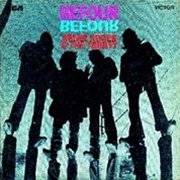 |
Befour [Brian Auger & the Trinity] (1970, 34.56) ***½/TI Wanna Take You HigherPavane No Time to Live Maiden Voyage Listen Here Just You Just Me |
 |
Closer to it! [Brian Auger's Oblivion Express] (1973, 36.30/59.48) ***/T |
|
| Whenever You're Ready Happiness is Just Around the Bend Light on the Path Compared to What Inner City Blues Voices of Other Times [CD adds: Whenever You're Ready |
Happiness is Just Around the Bend Inner City Blues Voices of Other Times] |
|
Current availability:
Mellotrons used:
After his groundbreaking work with Julie Driscoll, Brian Auger first made albums with the Driscoll-less Trinity, then shifted over to his own Oblivion Express, to explore the boundaries of jazz and rock more closely; whether or not you consider this a good thing will be tightly bound up with how you feel about jazz. 1970's Befour consists largely of Augered-up covers, with loads of ripping (if predictably jazzy) Hammond work, classical adaptation Adagio Per Archi E Organo (added to later versions) being particularly impressive. Mellotron strings (in the left channel only for some reason) on another classical piece, Pavane, but not enough to make a purchase worthwhile, methinks.
Three years on, Auger was on his fourth Oblivion Express LP, Closer to it and I really have to say here, if you ain't into jazz, you ain't gonna get it. I didn't... It's all impeccably played and arranged, but this is a jazz-rock record without much of the rock, to be honest. I mean, compared to, say, Airto Moreira's work, this is so... white. I find it difficult to pick out any highlights from something that's just so tame; suffice to say, this is jazz (Have I already said that?). Mellotron on one track, with an unexciting string part in the background on Inner City Blues, with the same on the extra version of the track on the CD. Whitey-boy jazz, then, albeit exceptionally well-played. You either love this stuff or you don't; it's pretty much innovation-free, like so much jazz from the last three or four decades. There's very little excitement to be had listening to Closer to it (in my humble opinion), although Befour is rather better.
See: Julie Driscoll, Brian Auger & the Trinity
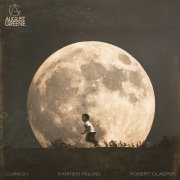 |
August Greene (2018, 50.10) ***/T |
|
| Meditation Black Kennedy Let Go Practice Fly Away Aya Piano Interlude No Apologies |
The Time Optimistic Swisha Suite |
|
Current availability:
Chamberlin used:
August Greene is a 'supergroup' consisting of rapper Common and a pair of producers, whose eponymous 2018 debut sidesteps many hip-hop clichés, utilising real musicians, not least drummer Karriem Riggins' work on most tracks. It's at its possible best on Black Kennedy, Piano Interlude (which includes the old philosophical conundrum involving the tree falling, unseen, in the forest, reiterated from opener Meditation) and No Apologies, although twelve-minute closer Swisha Suite is a bit of a grind for non-genre fans.
Patrick Warren plays what I presume are Chamberlin flutes on Fly Away, with a complex part that lifts the track noticeably, although why bassist Burniss Travis is credited with Mellotron on Meditation will have to remain a mystery.
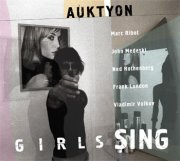 |
Girls Sing (2007, 61.05) ***/T |
|
| Profukal Padal Zhdat Rogan Born Tam-dam Slova Debil |
Vozle Menya Dolgi Devushki Poyut |
|
Current availability:
Chamberlin used:
Auktyon/Аукцьіон (duh, Auction) are a St. Petersburg-based band, whose origins date back to the dying days of the old guard in Russia, actually forming as early as 1983. 2007's Girls Sing (Девушки Поют) is something like their twelfth album, sung in Russian, as are all their releases, with a heavy Russian folk-influenced sound mixed in with the New York avant-garde crowd (John Medeski, Marc Ribot) with whom they worked on the recording. It's actually really difficult to describe this music; suffice to say, if you're after something a bit different and already appreciate the Medeski sound, you may well get something from it.
For once, Medeski plays Chamberlin, rather than Mellotron, with skronky pitchbent flutes on Zhdat (Ждать) and the tiniest smattering of the same on Dolgi (Допги). As is so often the case with the instrument, it could be on other tracks, but with several real woodwinds also present, it seems unlikely. So; a strange album, but a not entirely unpleasing one either, with one decent Chamby track.
See: John Medeski | Marc Ribot